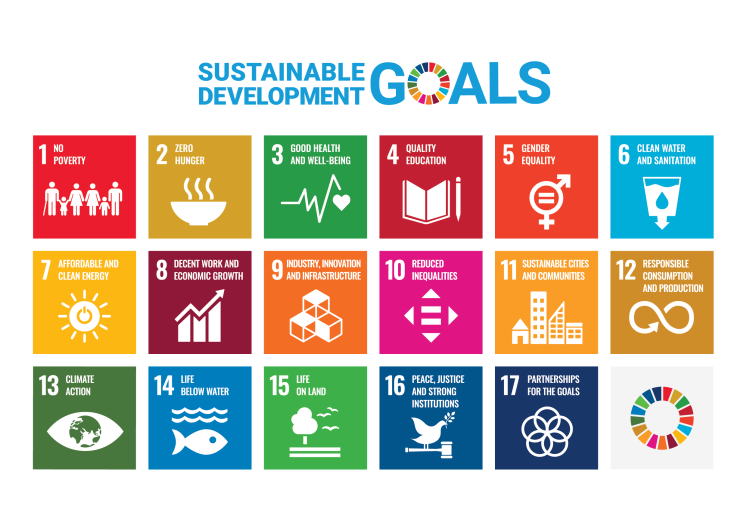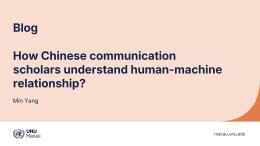Artificial intelligence (AI) has transformed our lives by connecting, informing and engaging people. AI could power progress and efforts to achieve the Sustainable Development Goals (SDGs) by 2030, provided AI technologies are harnessed responsibly and made accessible to all. With its broad applicability, AI has been used to detect and diagnose disease, predict and respond to natural disasters in Pakistan, and roll out public health services in the United Kingdom and education services in Sierra Leone.
As highlighted by the President of the UN General Assembly, “AI is proving to be an engine for us all to make up lost ground and even meet the Sustainable Development Goals”. AI could power progress for humanity by accelerating work, ending poverty, saving lives, protecting the planet and creating a more equitable world. However, the UN Secretary-General has emphasised both the “incredible possibilities – and the potential dangers – of AI.” Potential harms that could be unleashed by AI include the accelerated spread of misinformation and disinformation, entrenchment of biases and discrimination, surveillance and invasion of privacy, fraud and other violations of human rights. Furthermore, malicious use of AI could undermine trust in institutions, weaken social cohesion and threaten democracy.
AI, Information and the SDGs
As countries aim to achieve sustainable development, the pursuit of information integrity has become a pivotal force. Promoting the safeguarding of information is a public good, as recognised in the Windhoek +30 Declaration. The emergence of AI underscores the urgent need for an international framework to steer the evolution and application of this public good.
UNESCO’s principles for the governance of digital platforms serve as a unique, global and multi-stakeholder tool for protecting freedom of expression and access to reliable information online. The UN’s Common Agenda calls for “empirically backed consensus around facts, science and knowledge”. As part of the Summit of the Future in 2024, the UN is also developing a Code of Conduct for information integrity on digital platforms to “provide a gold standard for guiding action to strengthen information integrity”. Furthermore, the UN General Assembly recently adopted a landmark resolution on steering AI towards global goods and the full realisation of the SDGs.
All these initiatives are designed to protect the integrity of information in the era of digital technology, guiding UN Member States through principles that address the complexities of the digital world. Their strategic direction not only combats misinformation and ensures information integrity but also aligns with the SDGs.
AI is a double-edged sword for information: while it holds the promise of enhancing information integrity, it also presents challenges that must be carefully managed through ethical considerations and robust policy frameworks. For example, AI helps individuals acquire digital literacy skills, empowering them with the tools to discern truth from fiction. AI therefore appears key to unlocking a world where information is not just consumed but critically examined and constructively utilised for the betterment of society. On the other hand, disinformation is polluting information ecosystems as AI tools are deployed to circulate false, misleading and hateful narratives.
AI can intensify infodemics during health emergencies, resulting in significant public health risks. Due to rising anti-vaccine sentiments, measles has resurged globally, affecting regions including the United States and Europe. In Africa, 1 in 5 children still miss essential, life-saving vaccines due to disruptions caused by the COVID-19 pandemic and armed conflict, and a troubling rise in vaccine misinformation eroding public confidence. These infodemics highlight the critical need for reliable information to support effective health interventions and safeguard public health.
Gendered disinformation is another pressing issue, jeopardising the progress of gender equality and the integrity of democratic systems. AI has been used to spread gendered disinformation content at scale, impacting women’s rights and representation. Historically discriminated communities are especially at risk, as such disinformation can intensify existing biases.
Promoting Ethical AI Development
AI can play a more significant role in enhancing information integrity, which is vital for achieving the SDGs. AI can be harnessed to combat mis/disinformation, thus supporting informed decision-making and public discourse that aligns with sustainable development principles. AI brings capabilities for developing fact-checking systems, automating fake news detection and moderating content to uphold ethical standards and protect information integrity. However, it is also important to address the ethical considerations and potential risks associated with AI, such as biases in algorithms that could perpetuate inequalities or infringe on privacy rights.
The United Nations University Institute in Macau (UNU Macau) is facilitating multi-stakeholder dialogue around responsible AI development and deployment to ensure information integrity. This includes the International Workshop on Ethical AI in the Asia-Pacific with UNESCO and the UNU Macau AI Conference 2024. UNU Macau and UN Women have developed e-learning modules on digital security for women’s civil society organisations human rights defenders in Southeast Asia, which focus on cyber-resilience and AI in the context of the Women, Peace and Security Agenda. UNU Macau’s work on developing gender-sensitive AI policies has identified high-risk uses of AI such as misinformation, misidentification and stereotyping. By providing policy solutions to mitigate these risks, UNU Macau aims to protect information integrity in the AI age.
Towards a Sustainable Future
Ensuring information integrity is crucial for achieving the SDGs. AI can be a powerful ally in this endeavour, provided its deployment is guided by ethical considerations and robust policies. The UN’s efforts to establish a Code of Conduct for Information Integrity and promote responsible AI development are vital steps in this direction.
As we move towards a more digital future, and as countries move towards the 2030 deadline for the SDGs, there is a window of opportunity to harness the potential of AI to support sustainable development. By tackling misinformation and promoting accurate, reliable information, we can create a more informed, equitable and resilient global society. Through collaborative efforts and a commitment to ethical standards, AI can play a significant role in fostering a sustainable future for all. The journey to achieving the SDGs is fraught with challenges, but by prioritising and ensuring information integrity through new technologies and methods, and particularly by harnessing the potential of AI, we can overcome these obstacles.




